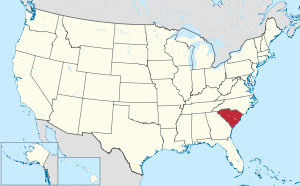This is an old revision of this page, as edited by Animum (talk | contribs) at 15:43, 7 June 2013 (Wrong link). The present address (URL) is a permanent link to this revision, which may differ significantly from the current revision.
Revision as of 15:43, 7 June 2013 by Animum (talk | contribs) (Wrong link)(diff) ← Previous revision | Latest revision (diff) | Newer revision → (diff) County in South Carolina| Lancaster County | |
|---|---|
| County | |
 Location within the U.S. state of South Carolina Location within the U.S. state of South Carolina | |
 South Carolina's location within the U.S. South Carolina's location within the U.S. | |
| Coordinates: 34°41′N 80°42′W / 34.69°N 80.7°W / 34.69; -80.7 | |
| Country | |
| State | |
| Founded | 1798 |
| Seat | Lancaster |
| Area | |
| • Total | 555 sq mi (1,440 km) |
| • Land | 549 sq mi (1,420 km) |
| • Water | 6 sq mi (20 km) 1.13% |
| Population | |
| • Total | 79,089 |
| • Density | 140/sq mi (53.9/km) |
| Website | mylancastersc |
Lancaster County /ˈlæŋkəstər/ is a county located in the Piedmont of the U.S. state of South Carolina in the Charlotte Metropolitan Area. As of the 2010 census, its population was 79,089. Its county seat is Lancaster.Template:GR
Geography and climate
According to the U.S. Census Bureau, the county has a total area of 555 square miles (1,437.4 km), of which 549 square miles (1,421.9 km) is land and 6 square miles (15.5 km) (1.13%) is water. It is bounded on the west by the Catawba River and Sugar Creek and on the east by the Lynches River.
Adjacent counties
- Union County, North Carolina - northeast
- Chesterfield County, South Carolina - east
- Kershaw County, South Carolina - south
- Fairfield County, South Carolina - southwest
- York County, South Carolina - west
- Chester County, South Carolina - west
- Mecklenburg County, North Carolina - north
Early history

For hundreds of years the Catawba Indians claimed all of present Lancaster County as part of their tribal lands. The Catawba were once considered one of the most powerful Southeastern Siouan-speaking tribes. The Catawba and other Siouan peoples are believed to have coalesced as individual tribes in the Southeast. Primarily involved in agriculture, the Catawba were friendly toward early European Immigrants.
When the first White people came in the early 1750s they settled between Rum Creek and Twelve Mile Creek. Waxhaw Creek within this area had taken its name from the Waxhaw Indian tribe. The majority of the new settlers were Scots-Irish from Pennsylvania; others from North Carolina and Virginia joined them.
Many of the early settlers came to South Carolina from Lancaster, Pennsylvania. They had named their county for the House of Lancaster which had opposed the House of York in the struggles of 1455-85, known as the War of the Roses. The House of Lancaster chose the red rose as their emblem while their neighbor, York County, boasts the white rose.
A second settlement was made in the lower part of the present Lancaster County on Hanging Rock Creek. The first grant was made there in 1752, and included the huge overhanging mass of rock from which the creek takes its name. About the time this section was opened up, others came in and settled along Lynches Creek, Little Lynches creek, Flat Creek, Beaver Creek, and lower Camp Creek. In coming to the Lancaster area, the first settlers had to follow old Indian paths, which became traveled so frequently, they were coming to be known as roads.
The Rocky River Road is an old route that originated as an Indian path. Along there in the American Revolutionary War, Colonel Abraham Buford fled from Tarleton and was overtaken a few miles south of the North Carolina state line where the Patriot forces were defeated in a controversial struggle known as the Battle of Waxhaws, also known as Bufords Massacre to locals. Today, the Rocky River Road is part of South Carolina Highway 522, the latter following the old thoroughfare very closely.
Demographics
| Census | Pop. | Note | %± |
|---|---|---|---|
| 1790 | 6,302 | — | |
| 1800 | 6,012 | −4.6% | |
| 1810 | 6,318 | 5.1% | |
| 1820 | 8,716 | 38.0% | |
| 1830 | 10,361 | 18.9% | |
| 1840 | 9,907 | −4.4% | |
| 1850 | 10,988 | 10.9% | |
| 1860 | 11,797 | 7.4% | |
| 1870 | 12,087 | 2.5% | |
| 1880 | 16,903 | 39.8% | |
| 1890 | 20,761 | 22.8% | |
| 1900 | 24,311 | 17.1% | |
| 1910 | 26,650 | 9.6% | |
| 1920 | 28,628 | 7.4% | |
| 1930 | 27,980 | −2.3% | |
| 1940 | 33,542 | 19.9% | |
| 1950 | 37,071 | 10.5% | |
| 1960 | 39,352 | 6.2% | |
| 1970 | 43,328 | 10.1% | |
| 1980 | 53,361 | 23.2% | |
| 1990 | 54,516 | 2.2% | |
| 2000 | 61,351 | 12.5% | |
| 2010 | 76,652 | 24.9% | |
As of the censusTemplate:GR of 2000, there were 61,351 people, 23,178 households, and 16,850 families residing in the county. The population density was 112 people per square mile (43/km²). There were 24,962 housing units at an average density of 46 per square mile (18/km²). The racial makeup of the county was 71.03% White American, 26.86% African American, 0.22% Native American, 0.27% Asian American, 0.02% Pacific Islander, 0.89% from other races, and 0.71% from two or more races. 1.59% of the population were Hispanic or Latino of any race.
There were 23,178 households out of which 33.40% had children under the age of 18 living with them, 52.60% were married couples living together, 15.50% had a female householder with no husband present, and 27.30% were non-families. 23.70% of all households were made up of individuals and 9.40% had someone living alone who was 65 years of age or older. The average household size was 2.56 and the average family size was 3.01.
In the county, the population was spread out with 25.40% under the age of 18, 8.60% from 18 to 24, 30.30% from 25 to 44, 23.60% from 45 to 64, and 12.10% who were 65 years of age or older. The median age was 36 years. For every 100 females there were 98.20 males. For every 100 females age 18 and over, there were 95.40 males.
The median income for a household in the county was $34,688, and the median income for a family was $40,955. Males had a median income of $30,176 versus $22,238 for females. The per capita income for the county was $16,276. About 9.70% of families and 12.80% of the population were below the poverty threshold, including 16.50% of those under age 18 and 15.80% of those age 65 or over.
Cities and towns
- Heath Springs, Kershaw, Lancaster
Unincorporated areas
- Buford, Indian Land, Van Wyck
Census designated places (CDP)
- Elgin, Irwin, Lancaster Mill, Springdale, Taxahaw
Notable residents/natives
| This section does not cite any sources. Please help improve this section by adding citations to reliable sources. Unsourced material may be challenged and removed. (October 2012) (Learn how and when to remove this message) |
- Bill Belk, Professional football player (San Francisco 49ers)
- Will Brice, Professional football player (St. Lois Rams, Cincinnati Bengals)
- Sheldon Brown, Professional football player
- Wayne A. Cauthen, First appointed African-American City Manager, Kansas City, MO
- Danny Clyburn, Professional baseball player (Baltimore Orioles, Tampa Bay Devil Rays, Pittsburgh Pirates)
- Shawn Crawford, Sprinter and Olympic gold medalist
- Don Dixon, Record producer, songwriter, musician
- Charles Duke, Astronaut and moon-walker
- Pep Harris, Professional baseball player (Cleveland Indians, Anaheim Angels)
- Jim Hodges, Former Governor of South Carolina
- Andrew Jackson, Seventh President of the United States
- Nina Mae McKinney, Actress and Broadway star
- Todd Ray, aka 'T-Ray', Grammy Award-winning record producer
- Julie Roberts, Country music singer
- Aaron Robinson, Major League Baseball player (New York Yankees, Detroit Tigers, Chicago White Sox, Boston Red Sox)
- Darrell Shropshire, Professional football player
- J. Marion Sims, Surgeon known as the "Father of Modern Gynecology"
- The People's Court, Original host of Doug Llewelyn
- The Zodiacs, led by Maurice Williams, R&B vocal group
- Jeff Twitty, Professional baseball player (Kansas City Royals)
- Brian Williams, Professional baseball player (Houston Astros, Detroit Tigers, Baltimore Orioles, Chicago Cubs, Boston Red Sox)
See also
References
- United States Census Bureau. "2010 Census Data". United States Census Bureau. Retrieved 29 January 2012.
External links
- Lancaster County Government
- 29seven20 - Lancaster, SC
- Lancaster County Chamber of Commerce
- Lancaster County Economic Development Corporation
- Lancaster County School District
- Sciway: Lancaster County
| Places adjacent to Lancaster County, South Carolina | ||||||||||||||||
|---|---|---|---|---|---|---|---|---|---|---|---|---|---|---|---|---|
| ||||||||||||||||
| Municipalities and communities of Lancaster County, South Carolina, United States | ||
|---|---|---|
| County seat: Lancaster | ||
| City |  | |
| Towns | ||
| CDPs | ||
| Other communities | ||
| Footnotes | ‡This populated place also has portions in an adjacent county or counties | |
| Charlotte metropolitan area | |||||||||||||
|---|---|---|---|---|---|---|---|---|---|---|---|---|---|
|  | ||||||||||||
| |||||||||||||
| |||||||||||||
| North Carolina | |||||||||||||
34°41′N 80°42′W / 34.69°N 80.70°W / 34.69; -80.70
Categories: